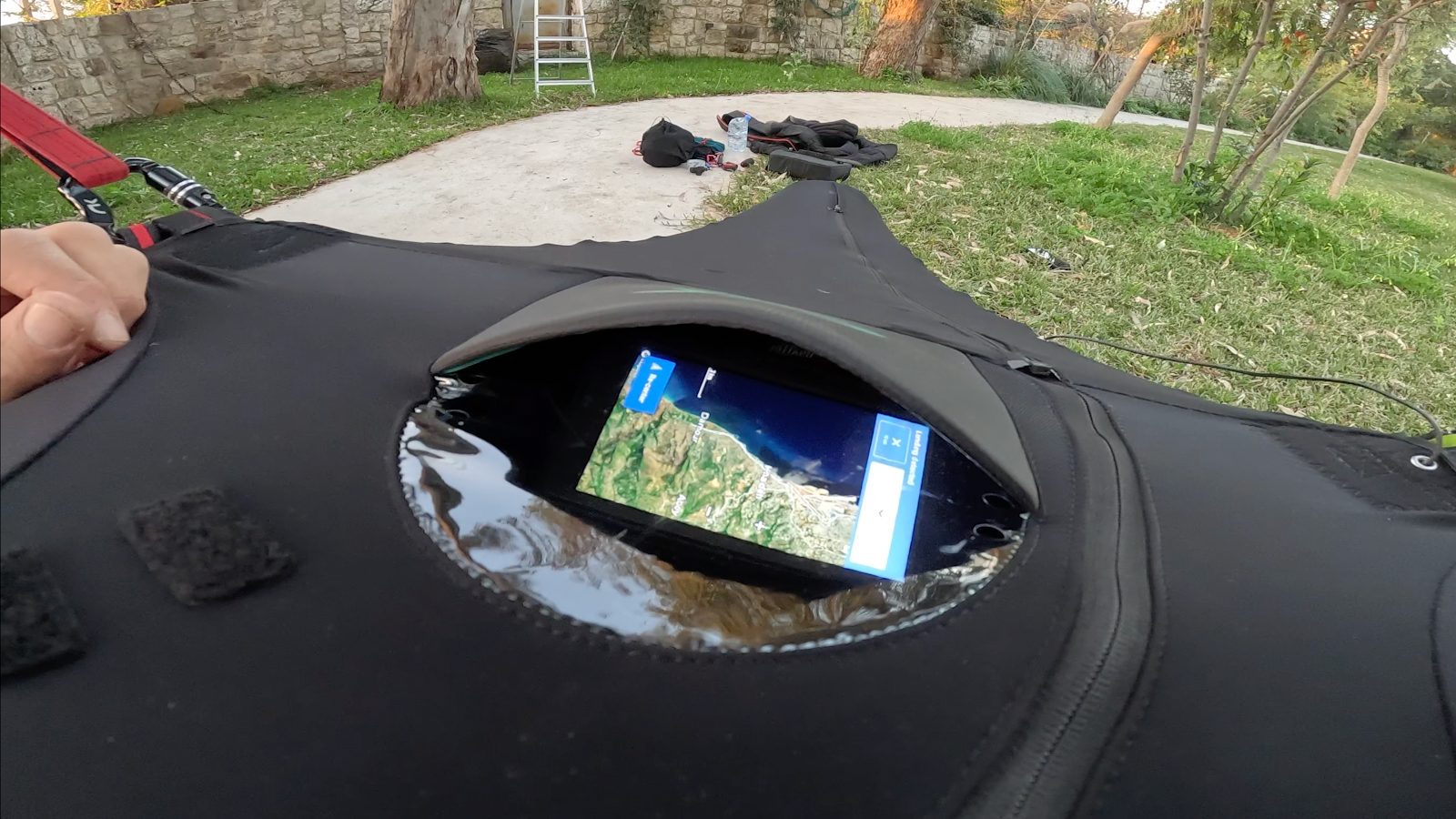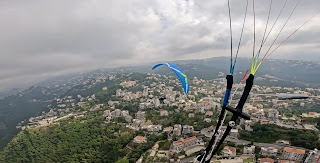positioning the rear fairing higher to reach that ultimate position, your sitting will be slightly reclined. On the Arrow L, the max layback position is still 3-4 cm forward than on the Drifter 2 perfectly streamlined position.
Thursday, March 7, 2024
Niviuk Drifter 2 size M
positioning the rear fairing higher to reach that ultimate position, your sitting will be slightly reclined. On the Arrow L, the max layback position is still 3-4 cm forward than on the Drifter 2 perfectly streamlined position.
Thursday, February 22, 2024
Zoom X2C size 95
Zoom paragliders is a new brand, https://www.zoom-paragliders.com/en/ created in the Papesh GMBH group and designed by Alex Hollwarth, who began his journey at Skywalk and delivered in that time fine creations among the Cayenne 5 which was a really fine glider to fly. The first released glider from the manufacturer is the Zoom X2C which is a 2-liner C class glider. https://www.zoom-paragliders.com/en/products/x2c
I have flown the Zoom XC2 95, from 92 to 95 all up,
At first, the launching is straightforward, as the Zoom inflates easily even without any wind and no hard point. In stronger wind, it is fast in the second half of the rise, but also very responsive to your brake input to keep it swiftly overhead.
I flew the Zoom in weak, moderately winter-strong thermals, and later in some turbulent air.
The brake travel is moderate to short and with 10-15 cm, I could place the glider accurately inside the core. The Zoom X2C is a pleasurable glider to fly. Direct feel through the brakes, and direct control. The pressure on the brakes are on the moderate side, and well balanced. I could steer the glider with just 10-15 cm of brake travel efficiently.
Climbing in very weak thermals less than 0.5 m/s felt similarly efficient to the Scala 2 with the same size in that area. In a more solid thermal, the Zoom climbs well compared to the other 2 liner C’s.
In strong air, the feel under the Zoom is really compact, easy, and quite manageable for the 2 liner C category. It felt in overall comfort like the Volt 4 and Bonanza 3 which are quite accessible 2 liners.
As I already wrote, what I appreciated even in strong air, was the brake authority given to the pilot. I could play around under that glider endlessly, with complete control. The brake pressure is on the moderate side and the travel is short to moderate with a lovely combination of agility in thermals. After two turns in a wingover, you can feel the high energy stored in that glider! Lovely handling.
I think the Zoom is among the 2 liners that you enjoy flying, because of its playful and forgiving character.
The ability to core without pitching back or forward is present under the Zoom. It just enters thermals and moves forward in balance. I was able to do two long glides next to a Photon MS same size and load, and I was impressed by that glide! IN very calm air, I wasn't losing an inch in those two glides even at half the speed bar! Pretty good balanced glide for the Zoom. When gliding in moving air and lift lines, we felt that the Zoom shares the glide similarly to an Artik R, or Mint, for example.
The B steering is quite efficient in controlling the glider movements in turbulence while staying on bar, and the B pressure is on the moderate side with good accessibility.
The speed bar has a moderate pressure throughout the whole range, and full speed reached the same as the Photon with around 18 km/h over the trim speed.
Ears are stable and usable with outer B’s or outer A’s.
Please note that different sizes with different loads ‘could' have another feel. On the Zoom X2C size 95 at 92 I was happy test flying that glider!
Conclusion:
The new Zoom X2C ticks all the boxes evenly. Nice handling, pleasurable to fly, agile to play around, excellent gliding performance, and good speed for a 2 liner.
If you want to get a high ratio of fun, comfort, and good performance, a test flight could be the right choice!
Happy testing,
Ziad
Friday, December 29, 2023
Niviuk Ikuma 3 size 24/ range 75-95
Niviuk Ikuma 3 size 24/ range 75-95
Tuesday, December 5, 2023
Mac Para Verve 23
Thursday, November 9, 2023
NOVA Codex S 80-100 / 105
Tuesday, October 31, 2023
Ozone Forza 2 M size
Hi,
Harness comparison ( Update)
Test flying harnesses are the most difficult and sometimes highly inaccurate, as each individual even with the same height and weight shares a completely different anatomy. This test is to get a 50 % idea of what to expect, and it is more important to test-fly a harness than it is to test-fly a paraglider. Testing harnesses consist of sitting in a harness for more than 20 minutes if you can, adjusting it, and feeling if there are any hard points on your body. Then a flight could give you a higher idea of the roll feedback you wish to receive and cope with.
As harnesses are a very personal choice for each individual for roll, and especially for body comfort, this pre-test before buying is very important as it will surely maximize your future flights and acheive your expected potential with no stress on your sitting position or leg support concentrating on the task ahead. Any pilot can cope with any of the above harnesses in roll. It is only a matter of training and getting used to it.
Please consider that a moderately stable harness that combines stability and a pleasurable roll feel, is very different for each individual from a 15 to an 85-year-old pilot. Finding your own “balance" will also reduce energy consumption while keeping the lovely flying spices!
Happy and safe flights.
Most comfortable seated harness. As 1 being most comfortable “ONLY for the seating position”.
1-Impress 4 / Impress 3 /Lightness 2/3
2-Forza 2 / Arrow / Nearbird Vibe
3-Genie Race 2 / Exoceat/ Genie race 4/ Genie light 3 / Delight 4 /Submarine
4-X-Rated 6 / Genie Race 3 / Genie lite 2 / Gin X-Alps/ Woody Valley GTO 2
5- Woody Valley GTO 1
Most comfortable in roll (In roll stability ). As 1 being most comfortable.
1-Ozone Exoceat/ Delight 4/ Delight 3/ Arrow/ Forza 2
2-Genie Light 1 / WV GTO 1 / Forza 1 / Gin X-Alps / Nearbirds Vibe X-Rated 6 XL / Genie Race 3 /Genie race 4
3-Impress 2 + / Genie lite 2/ Ozium 2/ Lightness 3 /Genie light 3
4-Genie Race 2 / Ozium 1/
5-Impress 3/ Lightness 2
Harnesses that deliver a naturally supported leg in the pod.
—— Exocet / Forza 1/ Impress 3 / Lightness 1/2/3 /Nearbirds Vibe/ Arrow M & L / Forza 2/ Delight 4 /Submarine
Conclusion: Manufacturers are trying to deliver more easy-to-fly and stable harnesses for the majority with better leg support and a two-rescue option.
The Nearbirds Vibe is a complete harness that fulfills those criteria while being comfortable. As a semi-light harness, I prefer the NK Arrow for its versatility, ease of use, and beautiful shape. I will be receiving an Airy Vibe to test fly…
I am also waiting for the Forza 2 L size to get a much better idea and feel, to decide if I am going to keep it as an X-rated 6 replacement harness or not… as I need to fly a slightly heavy harness for my tests (+,-) 7 kg.
Cheers,
Ziad
Friday, October 13, 2023
PHI Scala 2 19 - 75-100
cala 2 is created to glide, and the promise is reel.
Tuesday, October 10, 2023
Ozone Zeolite 2 GT. MS
Thursday, September 28, 2023
Saturday, September 16, 2023
MacPara Illusion 2 size 24 70-90
The Illusion 2 is a lightweight low EN-B from MacPara.
I flew the Illusion 2 with the Niviuk Arrow harness at 85 all up.
Pulling on the A risers launches the Illusion 2 smoothly even in nil wind. In the stronger breeze, it rises calmly and stays above the pilot's head. Take off with 85 all up on this size is ideal.
The brake travel is moderate to short with a quick reaction to turn the glider but still very forgiving if pulled further. The pressure is moderate to firm allowing a good connectivity for that level.
I flew in some strong turbulent air, and I was test-flying also the Ion 7 and the Buzz Z7. I think Illusion 2 seems calmer in all the pitch movements. In strong air, the Illusion 2 stays locked above the pilot's head with little brake applied. The roll is moderate and resembles the Ion 7 and the Z7.
For that class, all those gliders have lots of performance to offer especially when going into the airmass. The Illusion 2 as a low B is a good contender and is quite competitive in the way it enters the airmass and moves forward. As a low B, it is certainly slow to enter and to move, but still, it does the job very well. Further smaller details in the B comparison shortly.
Turning into thermals with the Illusion 2 is especially made for that class of pilots without too much dynamics, but still agile enough to turn tight every core, without missing it. The speed travel delivers around 11 km/h and still with a good glide angle. On one flight, I was pinned by a south wind and needed to push the full speed in order to move forward. I was surprised that after 10 km of full bar, the Illusion 2 kept on its rail, and got me slowly and smoothly to the other side of the mountain. I think nowadays, all those low B’s are very competitive, and they deliver a surprisingly high amount of performance for the newcomers to the sport, or even for the pilots who just want to fly for fun stepping down from a higher-rated glider.
The Illusion 2 can be slowed quite well to land in tight small places. Ears are stable, get you down around 2.5 or 3m/s if pulled higher, and reopen without pilot intervention.
Conclusion:
A light but reliable companion, for flying in big mountains. No stress, cool reactions, forgiving, and nice brake authority. Good overall performance to get the job done. I don’t know why, but after flying Illusion 2 I keep thinking of my lovely and peaceful Golden retriever…as if they share the same character…








































